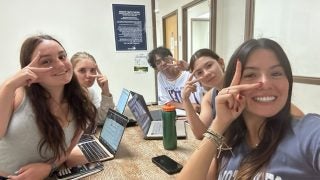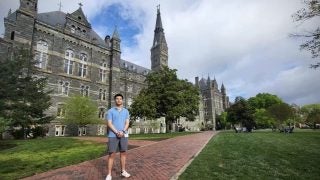Justin Higgins (C’28), originally from Albany, New York, is a first-year in the College of Arts & Sciences and a Georgetown Storyteller. He plans to study government with a minor in journalism.
One thing that sets Georgetown apart is the University’s Core Curriculum. On the Hilltop, all students, regardless of their school, are required to take three courses in social justice, and two courses each in philosophy, theology and writing. Additionally, students must take one course each in the humanities, sciences and quantitative reasoning. 
However, this serves as just the baseline. For example, as a student in the College of Arts & Sciences, I must also complete two history courses, two courses in the social sciences and a foreign language through the intermediate level. While this sounds like a lot, I soon realized that although there are many individual requirements within the Core, there is some overlap. For example, the two social science requirements will be naturally fulfilled with courses that are required for a student’s major, and there are many courses that can satisfy both the humanities and social justice requirements.
I also wondered to myself, Will I be able to take random courses that interest me? The answer is yes! The Core is designed to give all students a well-rounded liberal arts education. While this means knowledge in diverse subject areas, it also means a wide range of courses to choose from to satisfy each requirement. In my first year, I have been able to take courses in areas that I have zero background knowledge in to gain a better understanding of the world, such as Israel and World Politics; build on prior knowledge in Race, Policing, & Incarceration; and try a completely new form of writing in a Poetry Writing Workshop.
To ease some worry of future students, or even give some ideas to current students, I have compiled a (not exhaustive) shortlist of some interesting courses offered for the Fall 2025 term that fulfill the Core Curriculum — showing that Georgetown’s Core is not actually that scary or rigid. Courses that I have taken are in bold.
Georgetown Core Recommendations
Theology – 2 Courses
A hallmark Georgetown course is The Problem of God, which is taught by several Georgetown professors and traditionally taken by students in their first or second year. Alternatively, students may take Introduction to Biblical Literature as the first half of their theology requirement, which is what I did.
For the second half of the theology requirement, it’s recommended to take an upper-level course. Some interesting options include:
- Religion and the Self
- Psychedelics & Spiritual Healing
- Hell
- Feminist Biblical Interpretation
- Judaism in America
Humanities: Art, Literature and Cultures (HALC) – 1 Course
There are many studio class options that meet twice a week for 2.5 hours each meeting.
- Drawing
- Photography
- Sculpture
- Animation
- Graphic Design
There are also more traditional courses that touch on the different letters within the HALC acronym.
-
- Intro to Disability Studies
- Ways of Reading
- Comedy Writing
- Race & Racism in American Culture
- Post 9/11 Culture
- Poetry Writing Workshop
Science For All – 1 Course
Similar to the HALC requirement, some Science for All options are traditional science courses with a lab that many STEM students will likely naturally fulfill as a part of their major coursework. Other options are more tailored to students in other disciplines, hence the name, Science for All.
- Foundations in Biology I, II
- General Chemistry I
- Climate Change in the News
- Biodiversity and Conservation
- The Physics of the Atomic Bomb
- Sustainable Food Science
Quantitative Reasoning and Data Literacy – 1 course
- Probability and Statistics
- Mathematics in Society
- Poverty, Growth, and Inequality
- Management Accounting for Decision Making
Pathways to Social Justice – 3 courses
All students Class of 2028 and beyond must take UNXD 1200, the required one-credit University Seminar in Race, Power, and Justice at GU. In addition, students must take two overlay courses, with each school having school-specific options.
- Pandemics & Politics
- Mental Health in Global Development
- The Weaponization of Hate
Philosophy – 2 courses
There is a 2 course sequence for philosophy. Students will either take Introduction to Ethics and then select an upper-level General Philopshy course, or take Introduction to Philosophy and select an upper-level Ethics course. Next semester, the following courses sound interesting:
- Bioethics
- Just Wars
- Life, Death, and Meaning
- Environmental Ethics
Writing Requirement – 2 courses
All students take the Writing and Culture seminar, followed by a second course embedded in their major.
School Specific Requirements
History – 2 courses
Students in the College must take one survey course that covers the history of significant world regions over a long time span. The other required course is HIST 1099, which allows students to narrow their learning to the history of particular events, periods, or themes. This semester, one of my favorite courses is my HIST 1099 requirement, Race, Policing, & Incarceration. For the Fall 2025 term, interesting options include:
- Internationalism: The Geneva System
- History Focus: American Revolution
- History Focus: US Working Lives
Ignatius Seminars
Ignatius Seminars are optional opportunities open to all first-year students in the College. They span almost every core requirement, and some also touch on major and minor requirements. Ignatius Seminars are taught by a faculty member invited to teach something personal and meaningful to them. The seminars offer an intimate learning experience with small class sizes
While the Core Curriculum can feel intimidating at first, think of it as a way to guide you in exploring new areas of interest. Be sure to check the requirements for your school when planning your academic schedule. For more options, visit the Schedule of Classes, click on the “Attributes” bar, and search any requirement to see applicable courses.



